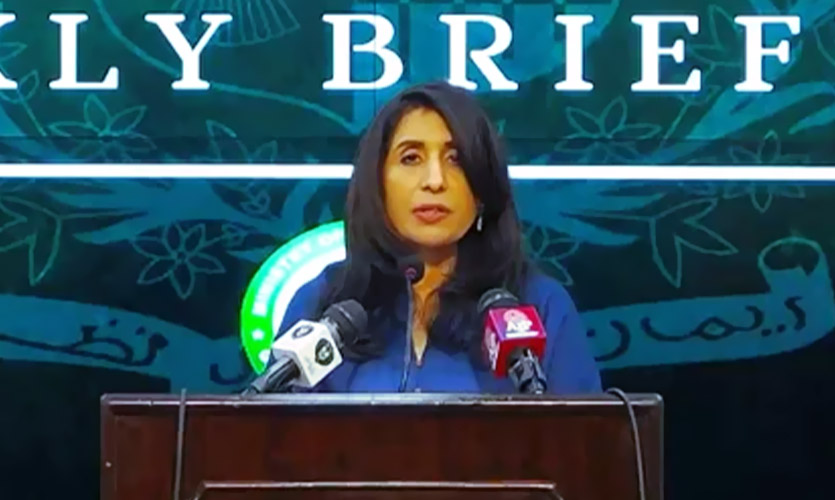In a new attack on India, Pakistan’s Ministry of Foreign Affairs has criticised New Delhi, saying that it should show some seriousness in engaging in dialogue to resolve all outstanding issues, including Kashmir.
During the weekly briefing, Pakistani Foreign Office spokesperson Mumtaz Zahra Baloch stated that the country continues to pursue a policy of peaceful neighbourhood with all other nations in South Asia. “Pakistan is interested in peace and dialogue and it is up to the Indian authorities to take a responsible position to improve relations,” she said.
“Pakistan consistently maintained that bilateral relations cannot fully normalise until the resolution of the outstanding disputes, especially the core issue of Jammu and Kashmir,” said the spokesperson, adding that Islamabad would work towards a resolution of the Kashmir dispute in accordance with previously issued UN resolutions.
She argued that a Hindutva-inspired nationalist government in India persists in acting as a regional bully and creating hindrances to normal bilateral relations. According to her, Pakistan is very concerned about the suppression of minorities in “Indian Illegally Occupied Jammu and Kashmir (IIOJK)” (PoK is officially recognised by Pakistan as IIOJK). In accordance with the relevant UN Security Council resolutions, Mumtaz said that Pakistan will continue making all possible efforts to settle the dispute.
Pakistan’s continued cross-border terrorism and the Kashmir row have strained relations between the countries. After India abrogated Article 370 on August 5, 2019, it revoked Jammu and Kashmir’s special status, and divided the state into two Union Territories. A strong reaction followed India’s decision, with Pakistan downgrading diplomatic relations and expelling the Indian envoy. Since then, bilateral trade relations have largely been frozen. India has repeatedly stated its stance to the international community and to Pakistan that J&K and Ladakh have always been and will continue to be integrated and inalienable parts of India.
On Afghanistan
Baloch addressed Pakistan’s position in Afghanistan. In response to a question about Afghanistan, the spokesperson said that Islamabad works closely with the Afghan authorities on all matters, including border management, diplomatic missions, and terrorism. According to her, Pakistan has consistently expressed a desire for a peaceful, prosperous, stable, and connected Afghanistan.
She added that Pakistan is keen to strengthen the existing multifaceted cooperation with Sri Lanka, Maldives, Nepal, Bhutan and Bangladesh. During important multilateral events and conferences, Pakistan’s Foreign Minister Bilawal Bhutto Zardari met with his counterparts from Bangladesh, Sri Lanka and the Maldives.
Concerning US-Pakistan relations, Baloch stated that there is strong momentum in bilateral relationships, particularly with the visits made by Zardari. She stated that the US nominated a Senate-confirmed Ambassador to Pakistan after four years. She went on to say that the US has agreed to Pakistan’s long-standing request for armaments, and expressed optimism that de-hyphenation will help in the improvement of bilateral ties.
In terms of diplomatic successes, the spokesperson stated that Pakistan was removed from the FATF grey list in October this year. She stated that another key success of Pakistan is the establishment of the ‘Fund for Loss and Damage’ at COP27 for poor nations. Baloch went on to say that Pakistan has a strategy of increased interaction with its close allies and friends. She reaffirmed Pakistan’s long-standing alliances with China, Turkey, Saudi Arabia, and the larger Islamic world. She also stated that these ties are built on mutual trust and goodwill, and are distinguished by a long history of active communication and bilateral visits.
In response to a question on Zardari’s foreign trips, Baloch stated that these trips demonstrate the international community’s desire to engage with Pakistan and establish understanding on a variety of topics. She also stated that Pakistan is keen on extending and strengthening its global friendships. The spokesperson said that by increasing connections, visits, and exchanges, Pakistan would be able to expand its friendship, collaboration, and communication with the worldwide community.
Read more: Pakistan Indicts India For Suicide Bombing Near Hafiz Saeed’s Home










